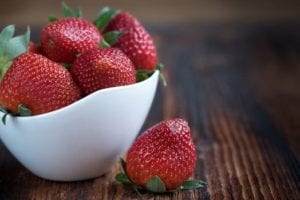Written by Jessica Patella, ND. A six-week consumption of 333 mg of strawberry and cranberry polyphenols significantly improved insulin sensitivity in the polyphenol group compared to the control.
 An estimated 30.3 million Americans suffer from diabetes, costing $327 billion per year 1. Worldwide it is estimated 592 million people will suffer from type 2 diabetes by 2035 2,3 . Research has shown a link between increased consumption of fruits and vegetables, especially berries, in reducing the risk of type 2 diabetes 2,4. Recent research found consuming polyphenols from strawberries and cranberries improved insulin sensitivity in overweight and obese adults 2.
An estimated 30.3 million Americans suffer from diabetes, costing $327 billion per year 1. Worldwide it is estimated 592 million people will suffer from type 2 diabetes by 2035 2,3 . Research has shown a link between increased consumption of fruits and vegetables, especially berries, in reducing the risk of type 2 diabetes 2,4. Recent research found consuming polyphenols from strawberries and cranberries improved insulin sensitivity in overweight and obese adults 2.
Polyphenols are plant chemicals that are typically found in berries and nuts and are rich in antioxidants. Past research has shown that polyphenols in plants may improve glucose metabolism and improve the risk of type 2 diabetes 2,5.
A study involving 46 participants, 20 males and 26 females (40-70 years of age) who were overweight or obese (BMI greater than 25 kg/m^2). All participants had insulin resistance based on fasting insulin levels that were greater than 60 pmol/l. Participants were randomly divided into a control group (n=23) or polyphenol group (n=23)2.
The polyphenol was provided as an energy free beverage formulated with purified water, sucralose and 1.84 grams of dried strawberry and cranberry polyphenol extracts, providing a daily dose of 333 mg of polyphenols 2. The amount of polyphenols was equivalent to the intake of approximately 2-servings of fresh fruit. Red food color was added to the control beverage so that control and beverage would look the same and both were provided in dark bottles 2.
After 6-weeks of consuming the beverages the following results were observed:
- Insulin sensitivity improved by 14% in the polyphenol drink group (P=0.05)
- Insulin sensitivity decreased by 7% in the control group (P=0.28)
- When compared to baseline the polyphenol beverage group also had a significant improvement in insulin sensitivity (P=0.03) compared to control.
- There were no differences observed in glucose measures
In conclusion, 333mg of polyphenols from strawberries and cranberries may improve insulin sensitivity. Larger studies over a longer period of time are warranted to determine the role of polyphenols in preventing or delaying the onset of type 2 diabetes 2.
Source: Paquette, Martine, Ana S. Medina Larqué, S. J. Weisnagel, Yves Desjardins, Julie Marois, Geneviève Pilon, Stéphanie Dudonné, André Marette, and Hélène Jacques. “Strawberry and cranberry polyphenols improve insulin sensitivity in insulin-resistant, non-diabetic adults: a parallel, double-blind, controlled and randomised clinical trial.” British Journal of Nutrition 117, no. 4 (2017): 519-531.
© The Authors 2017. This is an Open Access article, distributed under the terms of the Creative
Commons Attribution licence (http://creativecommons.org/licenses/by/4.0/), which permits unrestricted re-use,distribution, and reproduction in any medium, provided the original work is properly cited.
Click here to read the full text study.
Posted September 11, 2018.
References:
- Association AD. Statistics and Diabetes. http://www.diabetes.org/diabetes-basics/statistics/ Accessed 8-30-18, 2018.
- Paquette M, Larqué ASM, Weisnagel S, et al. Strawberry and cranberry polyphenols improve insulin sensitivity in insulin-resistant, non-diabetic adults: a parallel, double-blind, controlled and randomised clinical trial. British Journal of Nutrition. 2017;117(4):519-531.
- Federation ID. IDF diabetes atlas. Brussels: International Diabetes Federation. 2013.
- Mursu J, Virtanen JK, Tuomainen T-P, Nurmi T, Voutilainen S. Intake of fruit, berries, and vegetables and risk of type 2 diabetes in Finnish men: the Kuopio Ischaemic Heart Disease Risk Factor Study–. The American journal of clinical nutrition. 2013;99(2):328-333.
- Hanhineva K, Törrönen R, Bondia-Pons I, et al. Impact of dietary polyphenols on carbohydrate metabolism. International journal of molecular sciences. 2010;11(4):1365-1402.

